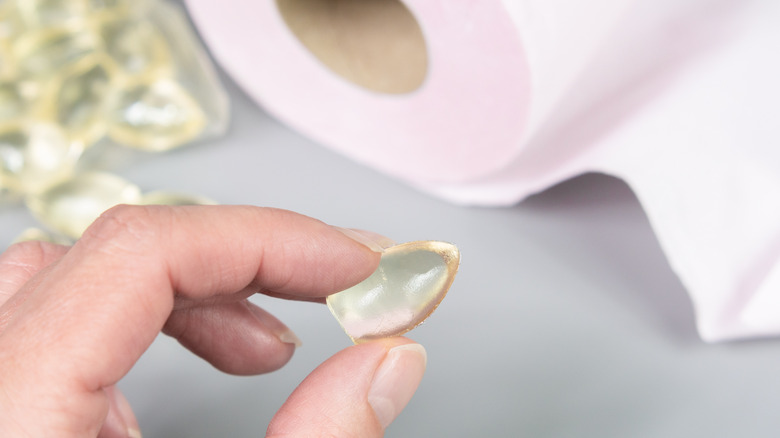Stool Softener Vs. Laxative: Which Is The Better Treatment For Constipation?
Many doctors would recommend a stool softener or laxative for constipation. While both products can be effective, choosing one over the other depends on your needs. Generally, stool softeners are prescribed to people with heart disease, hemorrhoids, or anal fissures, and may help prevent straining during bowel movements. As the name suggests, these drugs make the stool easier to pass by softening it. The effects kick in within one to three days of use, according to the U.S. National Library of Medicine.
Note that all stool softeners are laxatives. Osmotic agents, stimulants, and fiber supplements have laxative effects, too. These medications serve the same purpose, but each has a different mechanism of action. For example, milk of magnesia and other saline laxatives work by pulling water into the intestines, explains Medical News Today. Stimulant laxatives, on the other hand, include senna, bisacodyl, and other over-the-counter or prescription drugs that increase peristalsis. Basically, they stimulate the muscle contractions that move food through the gut.
So, should you take a stool softener, or a laxative like Dulcolax or Senokot for constipation? The answer depends on the root cause of your problem and what other medications you are taking.
Stool softeners are a safer option
Along with fiber supplements, stool softeners are generally safer than other laxatives. These medications can be used on a daily basis without causing significant side effects, notes the Mayo Clinic. The downside is that they may not work for everyone. Current evidence doesn't support their use in the treatment of constipation.
Bulk-forming laxatives, such as psyllium husk and other fiber supplements, are safe to use daily. Generally, they take anywhere between 12 hours and several days to work, says Harvard Medical School. Other types of laxatives appear to be more effective, but they also carry a higher risk of side effects. Osmotic laxatives, for instance, may cause bloating, gas, diarrhea, and nausea, warn the experts at Harvard Medical School. The same goes for saline laxatives, which may lead to electrolyte imbalances.
Stimulant laxatives, such as castor oil, senna, and Dulcolax, are the most effective, but should only be used for occasional constipation. Their side effects range from nausea and vomiting to dehydration, dizziness, fainting, and bloody stools (via Medsafe). In the long run, they may affect bowel function and cause dependency, notes Harvard Medical School. These medications should be your last resort.
When to see a doctor for constipation
Unless you have an underlying condition, you should be able to relieve constipation through lifestyle changes. Simple things such as filling up on fiber, drinking more water, and staying active, can make all the difference. A daily stool softener or bulk-forming agent may help, too. Harvard Medical School recommends using an osmotic laxative like MiraLAX if you're still having problems.
Laxatives, whether we're talking about stimulants or stool softeners, are not a long-term solution. Sometimes, chronic constipation indicates an underlying problem, such as thyroid disease or irritable bowel syndrome (via the National University Hospital). If left unaddressed, it may lead to hemorrhoids, anal fissures, bowel incontinence, rectal prolapse, and other issues, warns the American Academy of Family Physicians. Considering these risks, it's better to see your doctor sooner rather than later.
The University of Texas at Austin recommends seeking medical help if you notice blood in the stool or other unusual symptoms, such as anal or rectal pain after having a bowel movement. Likewise, you should call your healthcare provider if you experience major changes in bowel habits. "For someone who has had regular bowel movements all their life, then all of a sudden develops chronic constipation, this can be a red flag as well," says Dr. Christopher Almario, a gastroenterologist at Cedars-Sinai.


